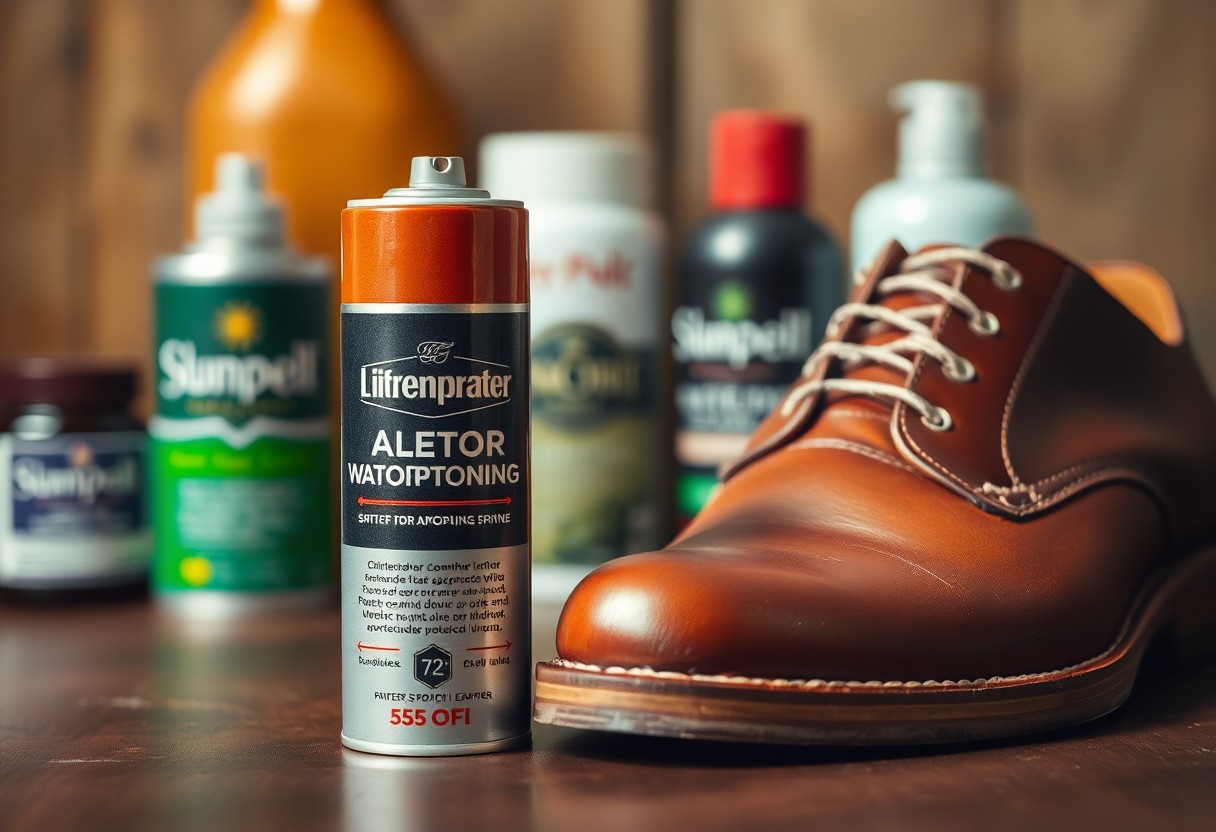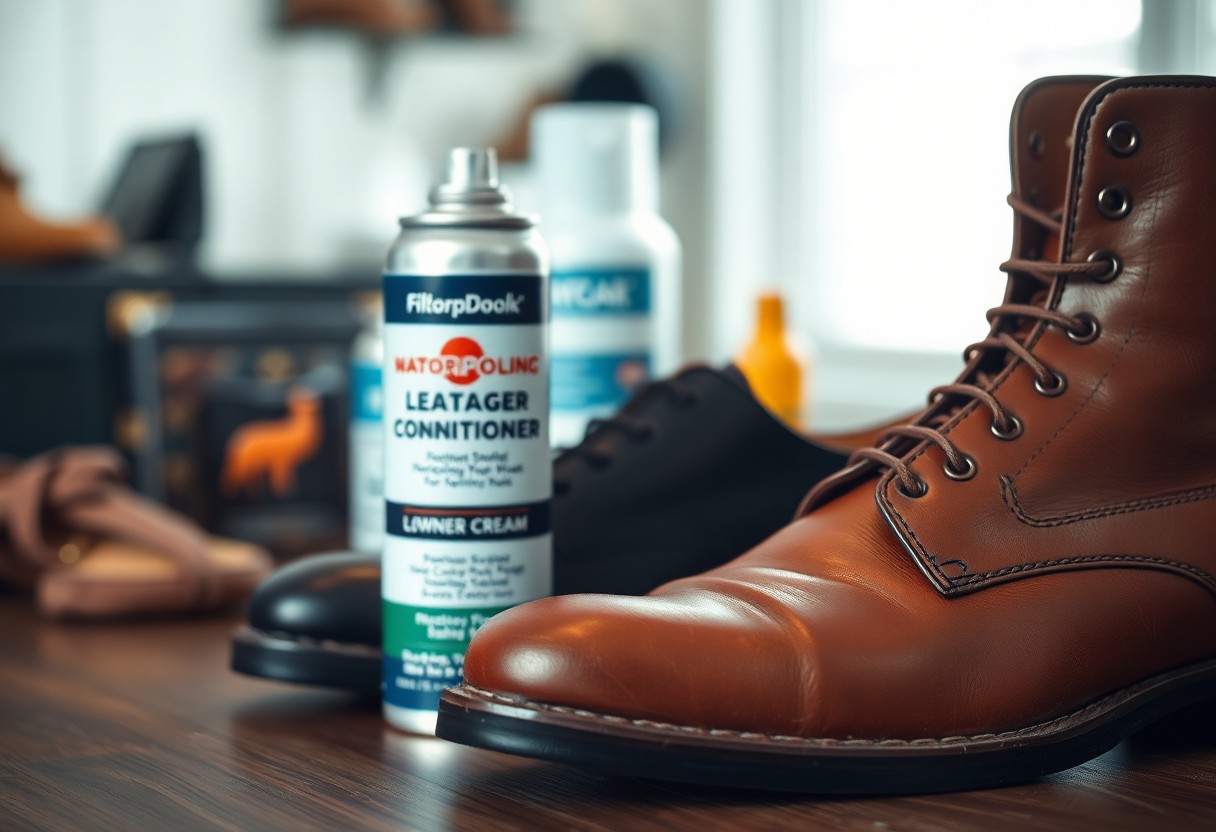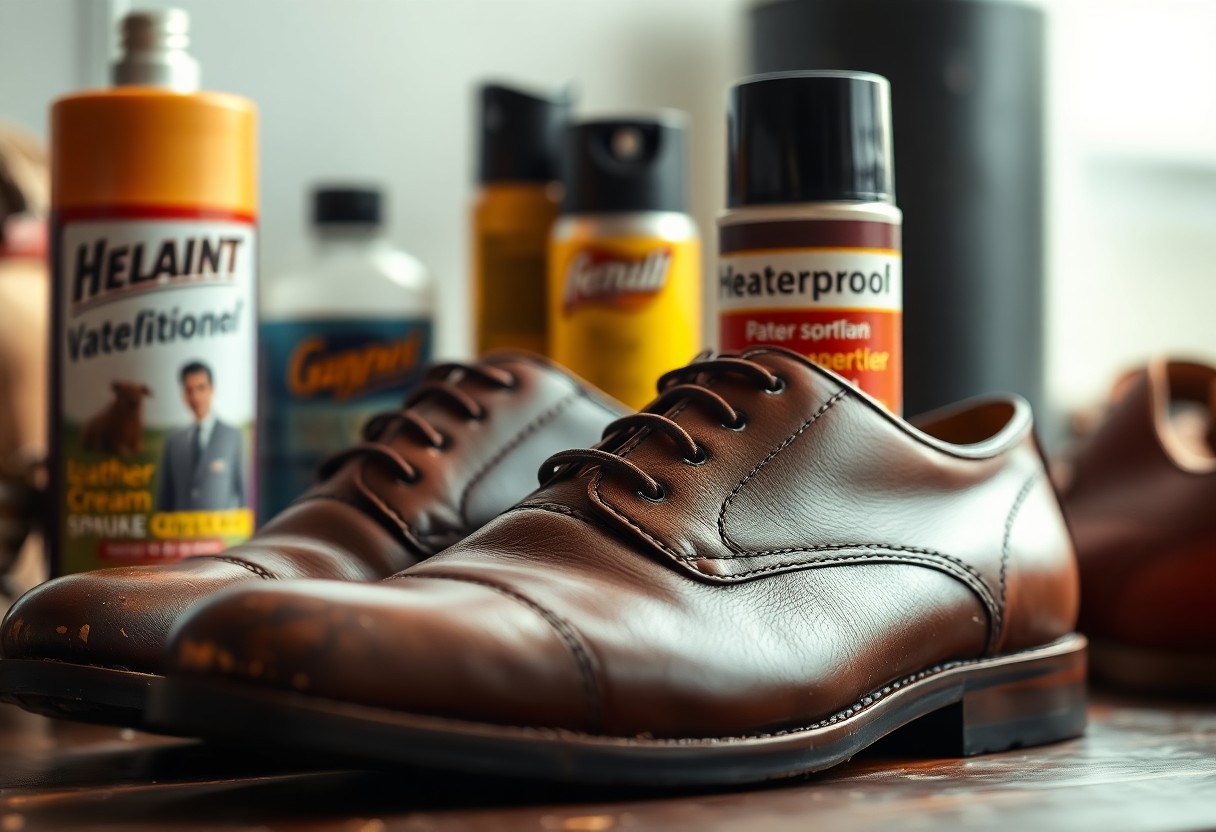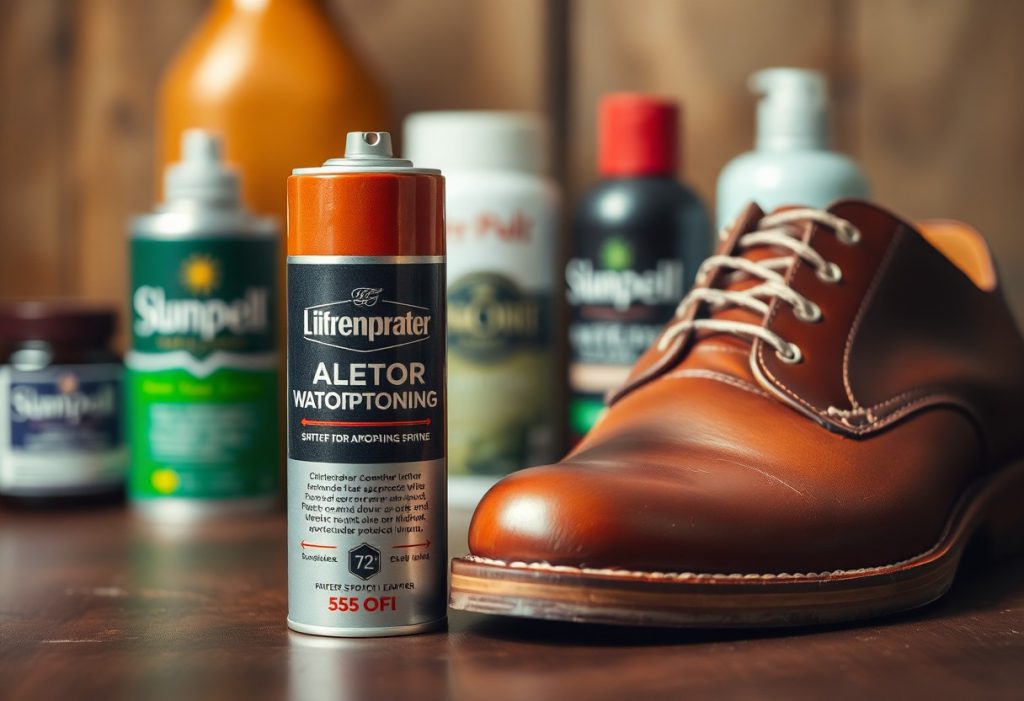Mistakes in Leather Care can result in permanent damage to your expensive leather shoes. One of the most common blunders is applying waterproofing spray on smooth leather. Although these sprays seem like a quick fix for protecting your footwear, they can hinder essential nutrients from penetrating the leather, leading to dryness and cracks over time. Smooth leather shoes naturally possess water-resistant properties within their grain layer, which need to be nourished with shoe creams and waxes to maintain durability. Instead of opting for sprays, choose high-quality leather conditioners and wax polishes that protect and nourish the leather, ensuring its longevity while preserving its natural beauty.
Mastering the Fundamentals of Leather Protection for Longevity
To ensure the long-lasting quality of your leather items, it’s essential to understand their protective characteristics. Full grain leather is endowed with natural water-resistant properties thanks to its tightly woven fiber structure. However, these qualities require consistent maintenance to remain effective. The overall durability of your leather items heavily depends on the care they receive. Utilizing waterproofing sprays can compromise the leather’s ability to breathe, which could lead to severe damage in the long run if not properly managed.
Uncovering the Unique Benefits of Full Grain Leather
Post tanning, full grain leather retains its original surface layer, providing remarkable natural protection. Items crafted from this material maintain an intact grain layer that offers resistance against water and daily wear. This top layer is rich in natural oils and fibers that form a protective barrier, making additional waterproofing sprays unnecessary and potentially harmful to the leather’s health.
Exploring Leather’s Moisture Management and Aging Process
Grain leather must retain its ability to absorb and release moisture effectively. The pores in your leather are crucial for its ability to breathe and regulate moisture, keeping it flexible and preventing unattractive cracking. However, the use of waterproofing sprays can seal these pores, blocking necessary airflow and disrupting the natural moisture balance. Furthermore, as leather ages, it requires proper nourishment through conditioning products. When these sprays are applied, they create a barrier that restricts essential conditioning oils from penetrating the leather, leading to dryness and brittleness over time. Regularly applying leather cream allows your leather to age beautifully and develop a rich, appealing patina.

Recognizing and Avoiding the Common Pitfalls of Waterproofing Sprays
Many people mistakenly believe that waterproofing spray is the ultimate solution for protecting their leather shoes, yet this common practice can lead to significant damage to your footwear. While these sprays provide an immediate protective barrier against water, they simultaneously block necessary nutrients from reaching the leather, creating conditions that may lead to long-term degradation.
Dispelling Common Misconceptions Surrounding Leather Care Products
With the pressure of aggressive marketing and advice from well-meaning shoe store personnel, you may have been misled into thinking that waterproofing spray is essential for all types of leather shoes. This misconception has been widespread, largely due to the high profit margins and frequent repurchase rates that accompany these products. The truth is that regular smooth leather possesses natural protective qualities that do not require additional spray-on barriers for effective safeguarding.
Weighing Immediate Advantages Against Long-term Ramifications
Damage to your leather shoes begins when waterproofing sprays create a barrier that blocks essential oils and conditioning agents from penetrating the leather. While you might notice improved water resistance initially, over time, the leather gradually becomes dry and brittle without the vital nourishment it needs. The consequences of using waterproofing sprays on smooth leather extend beyond surface-level protection. Your leather requires consistent nourishment to maintain its flexibility and durability. When shoe creams and conditioning products cannot penetrate the leather due to the spray barrier, the material risks cracking and deterioration, significantly reducing the lifespan of your shoes. Natural waxes and proper conditioning provide superior long-term protection while promoting the health of the leather.

Diving Deep into the Science of Effective Leather Care
A critical aspect of effective leather care involves understanding its molecular structure. The collagen fiber networks within your leather shoes require both protection and nourishment. When applying various products to leather, they can either coat these fibers or penetrate deep within. This interaction is vital for the long-term health and longevity of your leather shoes.
Understanding the Necessity of Nourishing Leather Regularly
It is crucial to recognize that your leather shoes demand regular nourishment to maintain their quality. The natural oils within your leather shoes prevent cracking and support flexibility. Over time, these oils diminish due to regular wear and environmental exposure. To preserve the leather’s structural integrity, it is essential to replenish these oils through consistent conditioning practices.
Grasping the Barrier Effects Created by Waterproofing Sprays
A significant drawback of waterproofing sprays is their tendency to create a barrier. When these sprays are applied to smooth leather, they form an impermeable layer that obstructs both water and vital nutrients. This barrier prevents your leather care products from effectively penetrating the surface, leading to a gradual decline in the leather’s quality over time.
The barrier effect of waterproofing sprays creates a problematic cycle for your shoes. While these sprays effectively repel water, they simultaneously hinder the absorption of conditioning products that are essential for preserving the leather’s health. Consequently, the leather may appear protected on the surface but is actually dehydrating and becoming brittle underneath. Silicone-based sprays are particularly harmful, forming a permanent barrier that is difficult to remove without damaging the leather.
Implementing Proven and Effective Leather Protection Strategies
Contrary to widespread beliefs, your smooth leather shoes require tailored care methods that align with the natural characteristics of full-grain leather. The most effective approach combines traditional techniques with products specifically designed to enhance the leather’s inherent protective qualities, ensuring both immediate safeguarding and lasting durability for your footwear.
Examining the Advantages of Wax-based Products for Leather Care
An excellent alternative to waterproofing sprays is premium wax-based products. These solutions work in harmony with your leather’s natural grain rather than against it. The application of wax polish creates a protective barrier that still allows the leather to breathe, making it particularly beneficial for areas subject to high wear, such as toe caps.
Maximizing the Benefits of Creams and Conditioners for Leather
In contrast to conventional spray treatments, leather creams and conditioners provide essential nourishment while preserving the leather’s innate protective properties. These products deliver oils that penetrate deeply into the material, helping to prevent drying and cracking. Furthermore, regular applications of cream and conditioner create a cumulative effect that enhances leather quality over time. The natural oils found in these products support the leather’s flexibility and strength while allowing it to develop a stunning patina. It is advisable to apply these products every 4-6 wears to maintain optimal leather condition.

Identifying Scenarios Where Waterproofing Spray is Appropriate
Unlike smooth leather, certain materials benefit greatly from waterproofing sprays. These products establish an effective water-resistant barrier on specific materials that lack innate protection. Waterproofing sprays are especially beneficial for suede, nubuck, and various textiles, where the material structure does not provide natural moisture resistance.
Enhancing Moisture Resistance for Suede and Nubuck Shoes
When you treat your suede or nubuck footwear with waterproofing spray, you significantly improve their resistance to moisture damage. While many modern suede materials come pre-treated with factory waterproofing, additional treatments can help maintain this defense over time. The application of the spray creates a protective barrier that effectively prevents water from penetrating these delicate materials.
Ensuring Proper Protection for Textile Footwear
In addition to leather alternatives, textile footwear requires dedicated protection against moisture damage. Materials such as canvas, mesh, and synthetic fabrics can achieve improved water resistance through appropriate spray application. Most textile materials are naturally absorbent, making them susceptible to water damage and staining.
Moreover, waterproofing sprays for textiles help maintain the shape and color of your shoes. The barrier they create also prevents dirt and debris from becoming embedded in the fabric fibers. It is recommended to reapply the spray every 3-4 months for optimal protection, depending on the frequency of use and the prevailing weather conditions.
Expert Insights on Best Practices in Leather Care
Not all leather treatments are created equal. Industry experts strongly advise against using waterproofing sprays on smooth leather. Your full-grain leather shoes require specialized care that allows them to breathe and absorb nourishing products. Using inappropriate products can lead to leather damage costing hundreds of dollars.
Valuable Insights from Tannery Professionals
To maintain the quality of leather, tannery professionals stress that full-grain leather naturally possesses water-resistant properties in its outer layer. Preserving the leather’s protective qualities requires the application of oils and waxes. Waterproofing sprays can inhibit these essential treatments from reaching the leather.
Guidance from Experienced Cobblers
For the long-term care of leather footwear, professional cobblers recommend using wax-based products instead of waterproofing sprays. Your shoes will benefit significantly from treatments that both protect and nourish the leather. Research indicates that 90% of premature leather damage arises from using incorrect care products.
By following proper leather care practices, your shoes can last an impressive 15-20 years, rather than just 2-3 years with poor maintenance. Traditional wax treatments allow leather to retain its natural features while offering sufficient moisture protection. Your investment in high-quality leather footwear deserves careful attention to ensure both visual appeal and durability.
Essential Takeaways for Optimal Leather Maintenance
In summary, your smooth leather shoes require appropriate care that excludes waterproofing sprays. Instead, opt for shoe creams and waxes that nourish the leather while providing effective moisture protection. Full-grain leather possesses natural protective qualities due to its grain layer, and waterproofing sprays can obstruct essential oils from penetrating the leather, leading to dryness and cracking. Reserve waterproofing sprays for suede, nubuck, or textile footwear where they can be effective. By selecting the right products, you can effectively protect your leather shoes while ensuring their longevity.
Your Leather Care Questions Answered
Q: Why is waterproofing spray harmful to smooth leather shoes?
A: Waterproofing spray creates a barrier on leather that prevents essential oils and conditioners from penetrating the material. While it does provide water protection, it also obstructs the necessary nourishment, leading to drying and potential cracking over time, which ultimately reduces the shoes’ lifespan.
Q: What alternatives should I consider instead of waterproofing spray on smooth leather shoes?
A: Instead, consider using a combination of shoe cream and wax polish. Shoe cream supplies essential oils to nourish the leather, while wax polish forms a protective layer that helps repel water. This approach works in harmony with the natural protective qualities of full-grain leather, supporting the leather’s health while providing effective moisture resistance.
Q: Which types of footwear can I safely treat with waterproofing spray?
A: Waterproofing spray is suitable for materials such as suede, nubuck, and textiles. These materials lack the natural protection found in smooth leather and thus benefit from the protective barrier created by waterproofing sprays. Many modern suedes and nubucks may already have factory waterproofing treatments, but additional applications can enhance and maintain this level of protection.
The Article Why you shouldn’t use waterproofing spray on regular smooth leather and better alternatives appeared first on My Shoes Finder
The Article Waterproofing Spray on Smooth Leather: Risks and Alternatives Was Found On https://limitsofstrategy.com


You’ve highlighted an important aspect of leather care that many overlook. I learned this the hard way with a pair of beautiful leather boots I adored. After using a waterproofing spray, they became stiff and lost their luster. Now, I always opt for cream conditioners that not only nourish the leather but also enhance its natural appearance.
It’s great to hear about your experience with leather care, and it really highlights how easy it is to make choices that can impact the longevity and appearance of our favorite items. Those leather boots you adored deserved more than what the waterproofing spray could offer. The stiffness and loss of luster can be so disheartening, especially when you genuinely love a piece.